The music of North Korea includes a wide array of folk, popular, light instrumental, political, and classical performers. Beyond patriotic and political music, popular music groups like Pochonbo Electronic Ensemble and Moranbong Band perform songs about everyday life in the DPRK and modern light pop reinterpretations of classic Korean folk music. Music education is widely taught in schools, with President Kim Il Sung first implementing a program of study of musical instruments in 1949 at an orphanage in Mangyongdae. Musical diplomacy also continues to be relevant to the Democratic People's Republic of Korea, with musical and cultural delegations completing concerts in China and France in recent years, and musicians from Western countries and South Korea collaborate on projects in the DPRK.
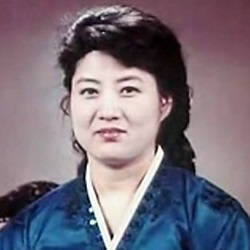
Ko Yong Hui, also spelled Ko Young-hee, was the mistress of North Korean supreme leader Kim Jong Il and the mother of his successor, Kim Jong Un. Within North Korea, she is only referred to by titles, such as "The Respected Mother who is the Most Faithful and Loyal 'Subject' to the Dear Leader Comrade Supreme Commander", "The Mother of Pyongyang", and "The Mother of Great Songun Korea".
The Pochonbo Electronic Ensemble (PEE) is an orchestra from North Korea (DPRK). It is famous for its performances of revolutionary and folk songs, as well as some covers of pop songs in the west, including one notable cover of "Brother Louie" by Modern Talking. They have been reported to be one of the country's most popular groups.
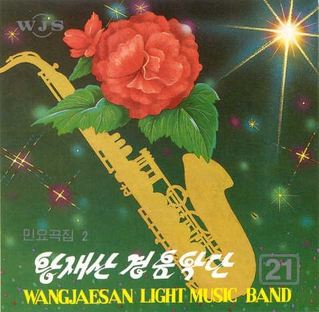
The Wangjaesan Light Music Band is a light music (kyŏngŭmak) group in North Korea. It is one of two popular music groups that were established by North Korea in the 1980s, both named after places where Kim Il Sung fought the Japanese in 1930s. It takes its name from Mount Wangjae in Onsong-gun, North Hamgyong Province, on the border with China, where Kim Il Sung is said to have held a meeting for anti-Japanese activities in 1933.
The "Song of General Kim Jong Il" is a marching song from North Korea. It was composed by Sol Myong-sun and the words were written by Sin Un-ho in 1997.
The Mansudae Art Troupe is a North Korean troupe of musicians that create light-classical operas and music, as well as dance pieces.

Ryu Mi-yong was the chairwoman of the North Korean Chondoist Chongu Party. She was a standing committee member of the 10th Supreme People's Assembly. She was known as a defector from South Korea to the North.

University of Sciences is a university located inside the region of the National Academy of Science in Pyongyang, North Korea. The university was previously called as "Institute of Natural Science". UOS is geographically located in Pyongsong, South Pyong'an Province, North Korea. However, North Korean government appointed the area of science district to belong to Pyongyang for giving some privileges of Pyongyang citizens to scientists of NAS and students of UOS. As Kim Il Sung, a former leader of North Korea, emphasized the significance of education for gifted and talented students, UOS originally started as a branch of Kim Il Sung University on January 17, 1967. It was separated from Kim Il Sung University in 1985. In North Korea, this university is known as "Sujae Daehark ". In South Korean mass media, this university is called "KAIST of North Korea".
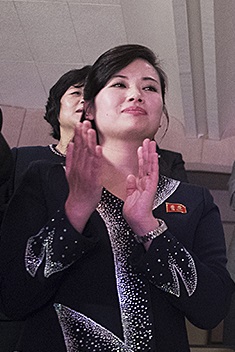
Hyon Song-wol is a North Korean singer, band leader, and politician. She is the leader of the Moranbong Band and of the Samjiyon Orchestra. She was formerly a featured vocalist for the Pochonbo Electronic Ensemble in the early 2000s, a pop group which found fame in North Korea in the late 1980s and 1990s. She has been a member in the Central Committee of the Workers' Party of Korea since 2017.

Kang Yong Sop was a North Korean politician, second son of deputy prime minister Kang Ryang-uk and Song Sok-jong. He served as chair of the Korean Christian Federation (KCF) and vice-president of the Korean Council of Religionists. He was also vice-president of the North Korean branch of the Pan-Korean Alliance for Reunification (PKAR), delegate to 12th Supreme People's Assembly (SPA) and member of the SPA Presidium, and director of the Pyongyang Theological Academy.
Kim Jong-suk is a North Korean government official. She is the chairwoman of the Committee for Cultural Relations with Foreign Countries, as well as a former editor-in-chief for the newspaper Minju Choson.

Hwang Sun-hui was a North Korean politician who served in several high-ranking positions in the Workers' Party of Korea (WPK), including in the Supreme People's Assembly and the Central Committee of the WPK. She was affiliated with the Korean Revolution Museum from 1965, and was its director from 1990.
Kim Jong-gwan is a North Korean politician and military officer who served as Minister of People's Armed Forces from December 2019 to September 2021.
Kim Kwang-chol is a politician from the Democratic People's Republic of Korea. He has served as Minister of Posts and Telecommunications in the Cabinet of North Korea since 2015 and is a candidate for the Political Bureau of the Central Committee of the Workers' Party of Korea. He was the deputy to the 13th convocation of the Supreme People's Assembly.
Kim Myong-guk (Korean: 김명국) was a North Korean politician and army general in the Korean People's Army. He was member of the Central Military Commission of the Workers' Party of Korea and served as member of the Supreme People's Assembly, North Korea's unicameral parliament.

"Where Are You, Dear General?" is a North Korean song, supposedly written by Kim Jong Il. Since at least 2008, the song plays through speakers of the Pyongyang Railway Station in the morning, albeit heavily distorted.
Ri Kyong Suk is a North Korean singer.
Pak Yong-il was a North Korean politician, who served as chairman of the Central Committee of the Korean Social Democratic Party as of 28 August 2019 and vice chairman of the Standing Committee of the Supreme People's Assembly.
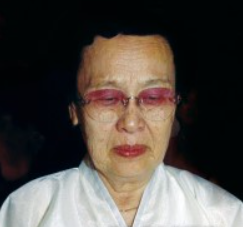
Ryo Won-gu was a North Korean politician. She is best known for her work on inter-Korean diplomacy during her time as chair of the Democratic Front for the Reunification of Korea and vice chair of the Supreme People's Assembly.
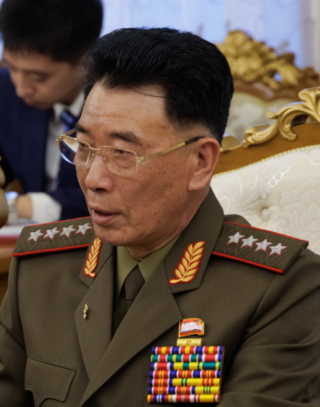
Kang Sun-nam (Korean: 강순남) is a North Korean politician and general who was the minister of Defence from 2022 to 2024. He is also a member of the Central Military Commission of the Workers' Party of Korea (WPK) and a member of the 8th Central Committee of the Workers' Party of Korea










